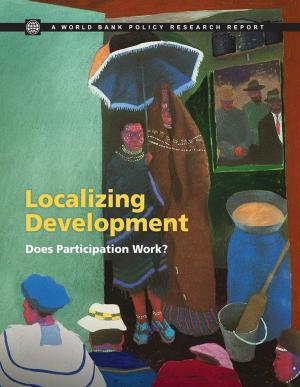Post-Crisis Growth In The Developing World: A Special Report Of The Commission On Growth And Development
Business & Finance, Economics, Economic Development| Author: | Commission on Growth and Development | ISBN: | 9780821381656 |
| Publisher: | World Bank | Publication: | December 28, 2009 |
| Imprint: | Language: | English |
| Author: | Commission on Growth and Development |
| ISBN: | 9780821381656 |
| Publisher: | World Bank |
| Publication: | December 28, 2009 |
| Imprint: | |
| Language: | English |
The 2008 financial crisis has raised a number of questions about the best strategy for achieving sustained growth and poverty reduction in developing countries, foremost among them whether the failure of the financial system also signifies the broader failure of market-oriented capitalist systems. The Growth Commission looks at this issue in its new report - Post-Crisis Growth in Developing Countries. It believes that the crisis was not a failure of market-oriented systems and that an outward-looking strategy, as suggested in the original Growth Report (published in May 2008), remains broadly valid. The following questions are discussed in this special report: • How has the economic landscape changed in the wake of the financial crisis of 2008? • What factors contributed to the onset of the financial crisis and its transmission from advanced to developing countries? • Should the crisis be interpreted as a failure of financial-sector regulation or as a broader failure of market-based systems? • What effects will the financial crisis have on the prospects for economic growth in developing countries? • How will the crisis impact the formulation of developing country growth strategies going forward? • What is the outlook for free trade and a growth model that capitalizes on the global economy? • How do actions by the advanced economies in response to the crisis affect the choices of policymakers in the developing world? • What is the appropriate role of government in the post-crisis economy? • How will the lessons of the crisis affect strategies for financial-sector development in developing countries? • What are the prospects for improved international oversight of global finance and cross-border financial flows?
The 2008 financial crisis has raised a number of questions about the best strategy for achieving sustained growth and poverty reduction in developing countries, foremost among them whether the failure of the financial system also signifies the broader failure of market-oriented capitalist systems. The Growth Commission looks at this issue in its new report - Post-Crisis Growth in Developing Countries. It believes that the crisis was not a failure of market-oriented systems and that an outward-looking strategy, as suggested in the original Growth Report (published in May 2008), remains broadly valid. The following questions are discussed in this special report: • How has the economic landscape changed in the wake of the financial crisis of 2008? • What factors contributed to the onset of the financial crisis and its transmission from advanced to developing countries? • Should the crisis be interpreted as a failure of financial-sector regulation or as a broader failure of market-based systems? • What effects will the financial crisis have on the prospects for economic growth in developing countries? • How will the crisis impact the formulation of developing country growth strategies going forward? • What is the outlook for free trade and a growth model that capitalizes on the global economy? • How do actions by the advanced economies in response to the crisis affect the choices of policymakers in the developing world? • What is the appropriate role of government in the post-crisis economy? • How will the lessons of the crisis affect strategies for financial-sector development in developing countries? • What are the prospects for improved international oversight of global finance and cross-border financial flows?















